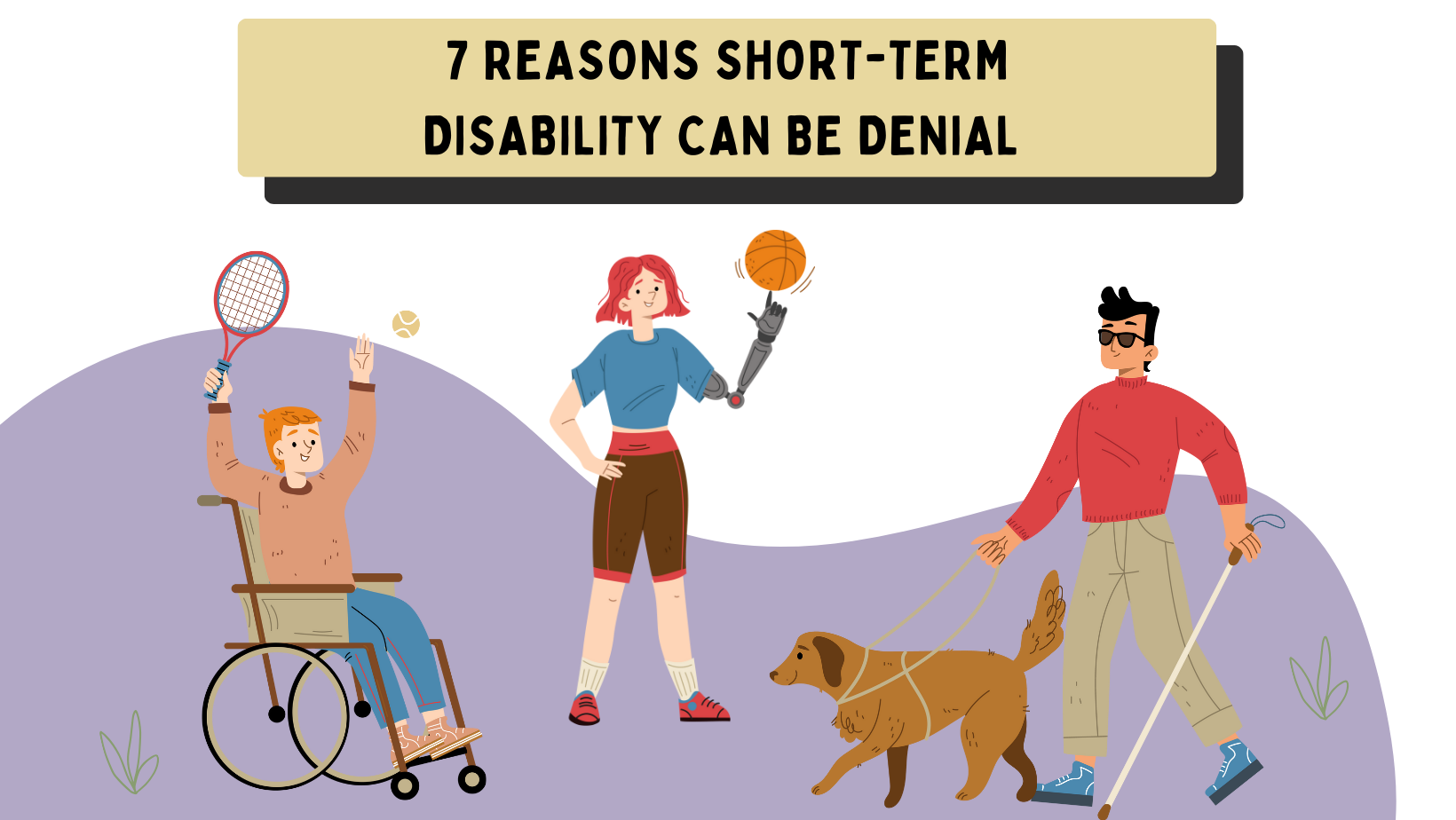7 Reasons Short-Term Disability Can Be Denied and How to Appeal the Denials

Short-term disability is a crucial financial safety net for individuals who are unable to work due to illness, injury, or other medical conditions. It provides temporary financial support during a challenging time. However, there are instances when short-term disability claims are denied, leaving individuals in a difficult situation. In this article, we will explore the common reasons why short-term disability claims can be denied and offer insights into how to effectively appeal such denials.
Short-term disability offers financial relief to those facing temporary health challenges. Unfortunately, not all claims are approved, leading to added stress for applicants. Understanding the potential reasons for denial and the steps to appeal can make a significant difference in securing the benefits you deserve.
Inadequate Medical Documentation
One common reason for denial is insufficient medical evidence. Insurance companies require detailed documentation that demonstrates the severity of your condition and its impact on your ability to work. Incomplete medical records can lead to misunderstandings and claim rejections.
Partnering with a complementary business can be an effective way to expand your brand reach. Collaborating on promotions, giveaways, or even co-created content can help introduce your services to new customers. When partnering with another company, it is important to keep in mind that their branding and messaging should still align with yours. This will ensure that the partnership will be beneficial and successful for both parties.
Pre-existing Condition
If your disability is related to a pre-existing condition, insurers might dispute your claim. They could argue that your condition was not caused by recent events and therefore doesn’t qualify for short-term disability benefits.
If you are dealing with a pre-existing condition, there are certain steps you can take to help strengthen your disability claim. It’s important to have detailed medical records that document the history of your condition and recent developments. Have all diagnoses and treatments documented in writing by your physician so that there is clear evidence of how your disability has impacted your ability to work?
Discrepancies in Medical Records
Discrepancies between different medical documents can raise concerns about the accuracy of your claim. It’s important to ensure that all medical records align and provide a consistent picture of your health condition.
It’s important to be aware of any inconsistencies that may exist between the documentation from different medical providers. These discrepancies can cause confusion for an insurance provider and could lead to delays in determining your eligibility or benefit amount. To minimize issues, make sure all medical records are up-to-date and accurately reflect your current health status.
Missed Filing Deadlines
Missing deadlines for filing your claim can result in automatic denial. Adhering to the specified timelines is crucial, as it demonstrates your commitment and seriousness about the claim.
It is essential that you adhere to the filing deadlines set for your claim—failure to do so can result in automatic rejection. Filing within the specified timeline shows your commitment and seriousness toward the claim. It demonstrates to the review committee that you understand the importance of adhering to these timelines, and it will be beneficial to both parties.
Lack of Occupational Impact
For a successful claim, your disability must impact your ability to perform your job duties. If the insurance company determines that your condition doesn’t hinder your work, they may deny your claim.
When filing for a long-term disability claim, you must provide detailed evidence of your disability and how it affects your ability to perform the duties of your job. You should include medical information supported by diagnoses from a physician that describes your condition and why it limits or prevents you from doing certain activities.
Insufficient Work History
Most short-term disability policies require a minimum work history to qualify for benefits. If you haven’t worked long enough for your current employer, you might not meet the eligibility criteria. It is important to remember that even if you do not meet the eligibility requirements for short-term disability coverage, there may be other options available to you. An alternative might be a privately purchased insurance policy, which can offer protection in similar circumstances. You’ll need to weigh the pros and cons of each option before deciding what is best for your situation.
Insurer’s Policies and Procedures
Each insurance company has its own policies and procedures for evaluating claims. If you’re not familiar with these guidelines, you might unintentionally submit incomplete or inaccurate information, leading to denial.
It’s important to be familiar with your insurance company’s claims process. If you don’t follow their guidelines, you could risk having your claim denied. To avoid this, ensure that all the necessary paperwork and information is submitted in a timely manner, according to the insurer’s instructions.
Steps to Appeal a Denied Claim
If your short-term disability claim is denied, don’t lose hope. You have the right to appeal the decision. Follow these steps to increase your chances of a successful appeal:
1. Gather Relevant Information
Collect all relevant medical records, test results, and doctor’s notes that support your claim. This comprehensive documentation can strengthen your case during the appeals process. In order to effectively appeal a denied medical claim, it is essential to have the right documentation in place. Gathering all relevant medical records, test results, and doctor’s notes can help make your case stronger when appealing the denial of coverage. Be sure to include as much detail as possible on each document that you provide in support of your claim – this will increase the likelihood of a positive outcome.
2. Consult Your Healthcare Provider
Your healthcare provider’s opinion carries weight. Discuss your situation with them and ask for a detailed assessment of your condition and its impact on your ability to work. It is important to remember that your healthcare provider’s opinion carries a great deal of weight and should be taken into consideration when making decisions about your work life. Therefore, it is essential to have an open dialogue with your doctor or other healthcare professionals in order to gain insight into the impact of your condition on your ability to perform certain tasks.
3. Understand the Insurance Policy
Thoroughly review your insurance policy to understand the terms and conditions. This knowledge will help you navigate the appeals process more effectively. It’s important to familiarize yourself with your insurance policy so you’re aware of the obligations laid out in it. Knowing this will help ensure that you understand all aspects of the appeals process and how they may be affected by certain policy provisions. Taking into account any limitations or exclusions that are included in your policy can also help you better plan for potential appeals scenarios.
4. Contact Your HR Department
Reach out to your HR department for guidance on the appeals process. They can provide insights and potentially advocate for you during the proceedings. Reaching out to the HR department is an important step in the appeals process. They can provide valuable insights and may be willing to advocate for you during proceedings. It’s also a good idea to have a clear understanding of both your rights and obligations before beginning the appeals process. Make sure to review all relevant documents provided by your employer, such as employment contracts or company policies, to ensure you’re properly informed.
5. File an Appeal
Follow the insurer’s official appeals process. Provide all necessary documentation and adhere to the deadlines. Clearly outline the reasons why you believe the denial was incorrect. If your insurance claim has been denied by the insurer, do not despair. There is an appeals process you can follow to potentially have your claim approved. You must adhere to all deadlines and provide any requested documentation in order for the appeal to be successful.
6. Consider Legal Assistance
If the appeals process becomes complex, seeking legal advice might be beneficial. An attorney experienced in insurance claims can provide valuable guidance. If the appeals process becomes complicated or you’re unsure what steps to take next, then it may be beneficial to seek legal counsel. Working with an attorney experienced in insurance claims can provide invaluable advice and guidance.
Conclusion
Facing a denied short-term disability claim can be overwhelming, but it’s important to remember that denial doesn’t mean the end of the road. By understanding the reasons for denial and taking proactive steps to appeal, you can increase your chances of receiving the financial support you need during your challenging times.












